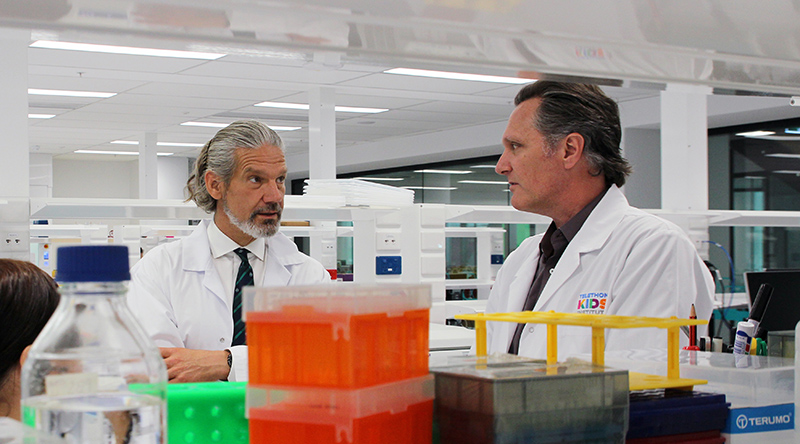Search

News & Events
Five researchers from The Kids awarded Early Career Child Health Researcher FellowshipsFive researchers from The Kids Research Institute Australia have been awarded three-year fellowships with the aim of keeping more WA-based PhD graduates involved in child health research.

News & Events
Children sought for study into how to prevent sore throatsMore than 1000 children are being sought for a study to learn more about sore throats and how best to prevent them.

News & Events
BHP commits $2.6 million to research focused on stopping COVID-19 spreadResearchers from The Kids Research Institute Australia will lead a world first trial to test the effectiveness of the drug interferon in stopping outbreaks of COVID-19 by reducing the infectiousness of people who contract the virus.

News & Events
The Kids researchers lead national trial to fight sepsis in premature infantsThe Kids Research Institute Australia researchers will lead a new national clinical trial (COSI-2) to determine whether topical coconut oil can reduce late onset sepsis in extremely preterm infants.
Research
Getting to grips with invasive group A streptococcal infection surveillance in Australia: are we experiencing an epidemic?Asha Rosemary Jeffrey Bowen Wyber Cannon BA MBBS DCH FRACP PhD GAICD FAHMS OAM MBChB MPH FRACGP PhD BSc(Hons) BBus PhD Head, Healthy Skin and ARF
Research
ASCOT ADAPT study of COVID-19 therapeutics in hospitalised patients: an international multicentre adaptive platform trialSARS-CoV-2 infection is associated with a significant risk of hospitalisation, death, and prolonged impact on quality of life. Evaluation of new treatment options and optimising therapeutic management of people hospitalised with SARS-CoV-2 infection remains essential, but rapid changes in pandemic conditions and potential therapies have limited the utility of traditional approaches to randomised controlled trials.
Research
The Impact of a Multifaceted Tertiary Pediatric Hospital's Antimicrobial Stewardship ServiceAntimicrobials are the most commonly prescribed drug class in children. Overuse through inappropriate prescribing is a key driver of antimicrobial resistance and is recognized as one of the top 10 threats to global health by the World Health Organization.
Research
Western Australian health care workers’ views on mandatory COVID-19 vaccination for the workplaceHealth care workers (HCWs) are at an increased risk of catching and spreading Coronavirus Disease 2019 (COVID-19) compared with the general community, putting health systems at risk. Several jurisdictions globally have mandated or are looking to mandate COVID-19 vaccines for this cohort, but little is known about the acceptability of this measure, especially in different contexts, and there is little qualitative data to explore nuance, depth, and the reasons behind HCWs’ opinions.
Research
Distinct Streptococcus pneumoniae cause invasive disease in Papua New GuineaStreptococcus pneumoniae is a key contributor to childhood morbidity and mortality in Papua New Guinea (PNG). For the first time, whole genome sequencing of 174 isolates has enabled detailed characterisation of diverse S. pneumoniae causing invasive disease in young children in PNG, 1989-2014.
Research
Spatial distribution of rotavirus immunization coverage in Ethiopia: a geospatial analysis using the Bayesian approachRotavirus causes substantial morbidity and mortality every year, particularly among under-five children. Despite Rotavirus immunization preventing severe diarrheal disease in children, the vaccination coverage remains inadequate in many African countries including Ethiopia.
